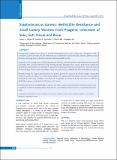Please use this identifier to cite or link to this item:
https://hdl.handle.net/20.500.14356/1749| Title: | Staphylococcus Aureus: Methicillin Resistance and Small Colony Variants from Pyogenic Infections of Skin, Soft Tissue and Bone |
| Authors: | Ansari, S Nepal, H P Gautam, R Shrestha, S |
| Citation: | AnsariS., NepalH. P., GautamR., & ShresthaS. (2015). Staphylococcus Aureus: Methicillin Resistance and Small Colony Variants from Pyogenic Infections of Skin, Soft Tissue and Bone. Journal of Nepal Health Research Council. https://doi.org/10.33314/jnhrc.v0i0.636 |
| Issue Date: | 2015 |
| Publisher: | Nepal Health Research Council |
| Article Type: | Original Article |
| Keywords: | Methicillin resistant Staphylococcus aureus (MRSA) Small colony variants Staphylococcus aureus Thymidine dependent strains |
| Series/Report no.: | May-Aug, 2015;636 |
| Abstract: | Abstract Background: Staphylococcus aureus (S. aureus) colonizing the nares, is the leading cause of hospital as well as community acquired infections. The aim of this study was to identify the S. aureus from skin, soft tissue and bone related  infections and typing them on the basis of antimicrobial susceptibility profile. Methods: Clinical samples were collected from patients with skin, soft tissue and bone related infections from January to October 2013 at Chitwan Medical College Teaching Hospital, Bharatpur. The S. aureus, small colony variants and methicillin resistant strains were identified by standard microbiological methods recommended by American Society for Microbiology. Antimicrobial susceptibility testing was performed by modified Kirby-Bauer disk diffusion method. Results: Among 333 samples processed, there was positive growth of S. aureus in 66 (19.8%) samples. Among the isolated S. aureus, 10 isolates were small colony variants of S. aureus and all the strains recovered were thymidine independent in this study. Amikacin, vancomycin and teicoplanin were found to be the most effective antibiotics. Methicillin resistance was found in 34.8% isolates of S. aureus. Conclusions: It can be concluded that, S. aureus is one of the causative agent of pyogenic infections and the trend of antibiotic resistant is alarmingly high and also the rate of methicillin resistant S. aureus is comparably high in this study. Keywords: Methicillin resistant Staphylococcus aureus (MRSA); small colony variants; staphylococcus aureus; thymidine dependent strains |
| Description: | Original Article |
| URI: | http://103.69.126.140:8080/handle/20.500.14356/1749 |
| ISSN: | Print ISSN: 1727-5482; Online ISSN: 1999-6217 |
| Appears in Collections: | Vol. 13 No. 2 Issue 30 May - August 2015 |
Files in This Item:
| File | Description | Size | Format | |
|---|---|---|---|---|
| 636-Article Text-1172-1-10-20151231.pdf | Fulltext Download | 224.67 kB | Adobe PDF |  View/Open |
Items in DSpace are protected by copyright, with all rights reserved, unless otherwise indicated.
